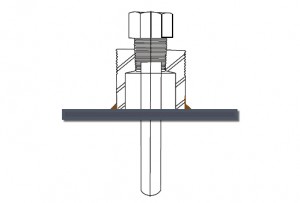Bad thermowells can lead to big problem in refinery operations. One single defective thermowell can shut down an entire unit, or an entire refinery. Paying close attention to the proper functioning of an otherwise mundane piece of equipment is the quintessential example of an employee’s commitment to safety and reliability stewardship. A bad thermowell is what turned the courageous Apollo 13 mission to the moon into a rescue mission.

Hundreds of thermowells trhoughout the plant require closer adherence to maintenance.
The problems with thermowells and thermocouples typically begin with the generation of measurement errors caused not by a bad thermowell, but perhaps due to some external factor affecting the transmission of an accurate reading. For example, ambient conditions may be lead to a 220°F temperature reading by the thermocouple due to condensate boil off, instead of the actual 550°F reading inside the vessel. This is why maintenance and operations departments should check transmitters more frequently and under various ambient conditions.
The bottom line is to avoid safety issues that expose operators to the process with a failed thermowell. Failed thermowell incidents discussed by delegates attending the RefComm 2016 refining conference in Galveston include a threaded thermowell “backing out” of the process or vessel.
Cost and time consuming measures may need to be taken to avoid these potential safety events. For example, it was discussed during the I&E session at RefComm 2016 that one hydrocracker operating at 2000 psi had to be shut down to replace 150 thermowells, in the interest of safety. This action required about three days for staff to replace all 150 thermowells. However, the real time and cost involved the week-long shut down and almost one week of time to restore this major conversion unit to full operation. The lost revenue from the downtime goes without saying that one bad thermowell could have led to a major safety incident.
This is why the replacement work nonetheless needs to be done. Some of the consequences reverberating all the way up to the corporate office after shutting down a major conversion unit may include not being able to meet a diesel contract. At the end of the day, this is just something that has to be done in the interest of safety.







Leave a Reply